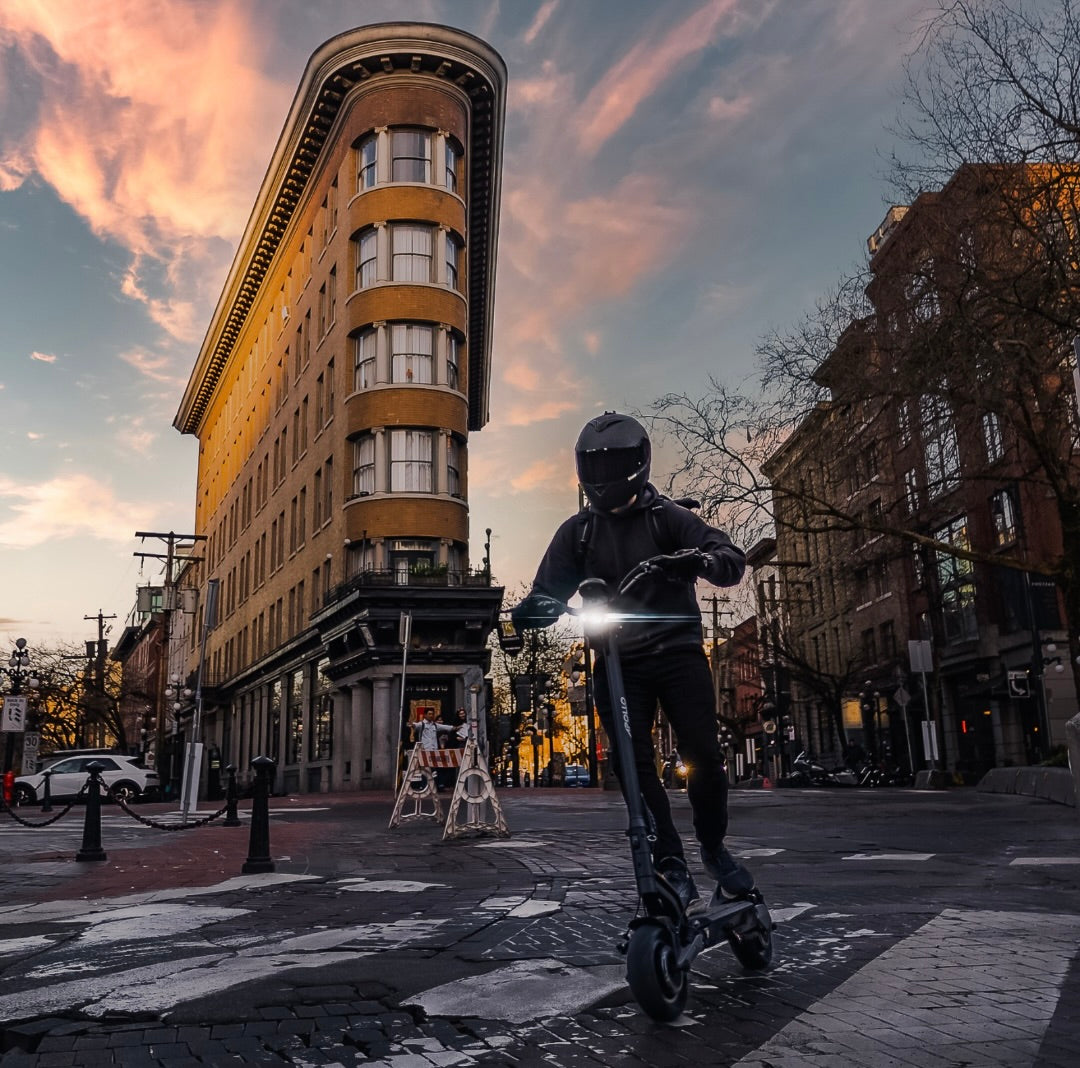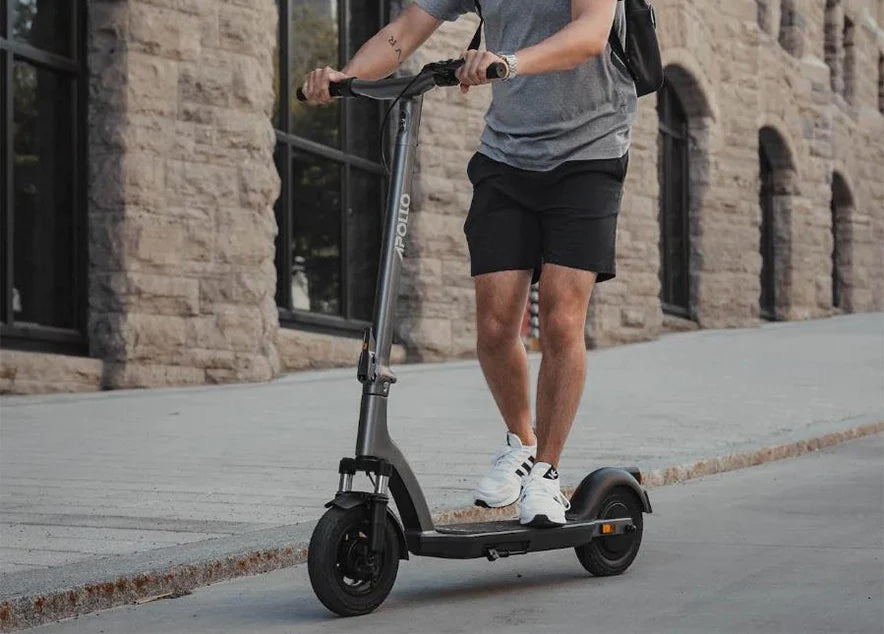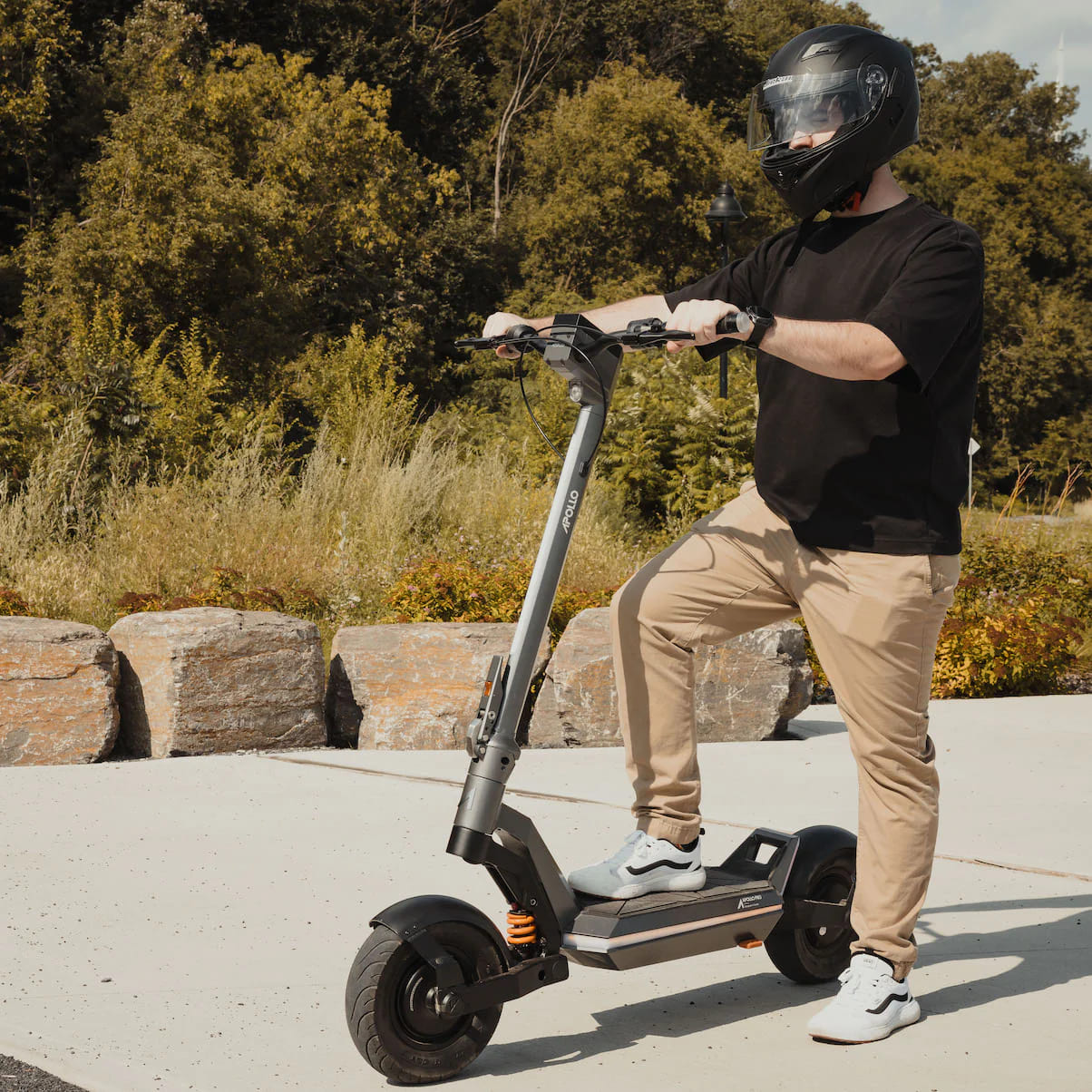With great power comes great responsibility. As electric scooters become increasingly more powerful and faster than ever, cities and governments worldwide are grappling with how to regulate them to ensure the safety of riders and pedestrians alike.
In this comprehensive guide, we'll take you through the electric scooter landscape in Canada. We'll explore the legal framework governing these innovative devices, delve into city-specific regulations, and provide practical tips to help you navigate the roads safely and responsibly.
This article is an updated version of our previous article on the same topic: https://apolloscooters.ca/blogs/news/are-electric-scooters-legal-in-canada
National Overview: Electric Scooter Laws in Canada
At the heart of Canada's embrace of electric scooters is a patchwork of regulations that reflect the country's commitment to safety and innovation.
Nationwide, electric scooters are recognized under the broader category of personal mobility devices, with specific rules to ensure public safety without stifling the freedom to ride.
Key regulations include the mandatory use of helmets for riders under a certain age, typically 18, and restrictions on riding on sidewalks in some areas to prevent pedestrian accidents. However, the laws governing electric scooter use, such as maximum speed limits and whether they're allowed on roads or bike lanes, can vary significantly from province to province and even from city to city.
City-Specific Regulations
While electric scooters used to be banned in many cities in Canada not so long ago, several of them have recently introduced pilot projects to regulate their use to balance safety and innovation.
Toronto
Toronto's stance on e-scooters has been a rollercoaster. While you're good to go on private property, taking your e-scooter out on public roads, bike lanes, or sidewalks may prove tricky. This is because e-scooters that can go over 24 km/h fall under the same laws as motorcycles. As such, they are expected to meet the same legal requirements, i.e., driving license, registration, and insurance.
Don't worry. As these laws are in constant flux, they may change very soon. So keep your ear to the ground.
Montreal
Quebec has a three-year pilot project regulating the use of motorized personal transport devices (MPTDs), including electric scooters. This project aims to see if e-scooters can be safely used alongside regular traffic and if changes to the Highway Safety Code are needed. Here are the key rules:
- Age: Riders must be at least 14 years old.
- Helmet: Wearing a helmet is mandatory.
- Where to ride: E-scooters can be used on roads with speed limits of 50 km/h or less and on bike paths.
- Speed limit: E-scooters must not exceed 25 km/h.
- Lights and reflectors: At night, a white front lights and red rear lights are required.
- Brakes: E-scooters must have working brakes.
- No passengers: Carrying passengers on an e-scooter is not allowed.
Violations of these rules could result in fines of up to $200, emphasizing the government's commitment to ensuring the safety of both the users and the public.
Vancouver

Vancouver is testing electric scooters in a three-year pilot program that started in July 2021. Here's what you need to know:
Where you CAN ride: E-scooters are allowed on local streets and protected bike lanes.
Where you CANNOT ride: Don't use e-scooters on sidewalks, major streets, or the Seawall.
Requirements:
- Maximum speed: 24 km/h
- Maximum motor power: 500W
- Brakes and lights (at night) are required
- Riders must be at least 16 years old and wear a helmet
Calgary
In Calgary, you can ride shared e-scooters on bike lanes, pathways, and quieter sidewalks (like 13th Avenue SW). Avoid riding on major roads like Macleod Trail. Here's what else you need to know:
Safety:
- Wash your hands or use hand sanitizer before and after your ride.
- Only one rider per e-scooter.
Fines:
- Avoid reckless riding! You could be fined $400 for reckless operation or collisions, and $75 for carrying a passenger.
- Park in designated areas to avoid fines.
Slow Zones: Some areas have a 15 km/h speed limit for e-scooters. Watch for signs.
General Rules:
- Always give way to pedestrians.
- Use your bell when passing others.
- Riders must be 18 or older.
- Helmets are recommended.
- Maximum speed is 20 km/h.
https://www.calgary.ca/bike-walk-roll/electric-scooters.html
Edmonton
E-scooter use is permitted in Edmonton, but with some restrictions. Privately owned electric scooters are currently off-limits due to safety concerns and a lack of regulation. To ride an e-scooter in Edmonton, you must use devices from approved shared programs. These scooters are allowed on cycle paths and on roads with speed limits of 50km/h or less. Riders must be at least 18 years old, and while helmets aren't mandatory, they're highly recommended.
Ottawa
Good news for e-scooter riders in Ottawa – you can ride them around, but there are different rules depending on if you own one or use the city's shared ones. If it's your e-scooter, make sure it's the "legal kind" (max speed of 32 km/h, lights, brakes, all that stuff). You can take it on bike paths, cycling tracks, and calmer roads.
For the shared e-scooters, you must be 16 or older, helmets are a must if you're under 18, and they have specific parking spots you need to use. Oh, and a big no-no for all e-scooters – absolutely no riding on sidewalks! The best place to double-check all the details is the City of Ottawa's website.
Winnipeg
Winnipeg's gotten on board with the e-scooter trend but with some limitations. Sadly, you can't take your own e-scooter out for a spin on public roads or sidewalks just yet. Currently, you'll need to use the ones from approved shared programs. You'll find them in specific areas of the city. The good news is that you can ride them in bike lanes and on roads with lower speed limits (max 50km/h). No word on helmets, but safety first, right? To be sure about the latest rules, check out the City of Winnipeg's website – they'll have the most up-to-date info.
Quebec City
Quebec City has a pilot project for shared e-scooters, but your own private e-scooter won't be legal on public roads. For the shared ones, here's the lowdown: you need to be at least 14 years old and wearing a helmet is mandatory. You can scoot around in bike lanes and on roads where the speed limit doesn't go above 50 km/h. Keep in mind that those e-scooter rentals have speed limits built in, so there is no need to worry about accidentally going too fast. The best place to check is the SAAQ (Québec's equivalent of the DMV) website for all the official details.
https://www.ville.quebec.qc.ca/en/
Licensing and Registration
There are no specific licensing requirements to operate an e-scooter in Canada. Generally, you won't need a driver’s license or registration for your electric scooter, unless it is treated as a motorcycle. In which case you may even need an insurance. Always check local regulations before riding.
Conclusion
Remember, knowledge is power. So, equip yourself with the necessary information, respect the regulations, and always prioritize safety.
If you’re in need of a safe, long-lasting, and what’s more important otherworldly e-scooter, check out our selection at Apollo Scooters.
Happy and safe riding!



















